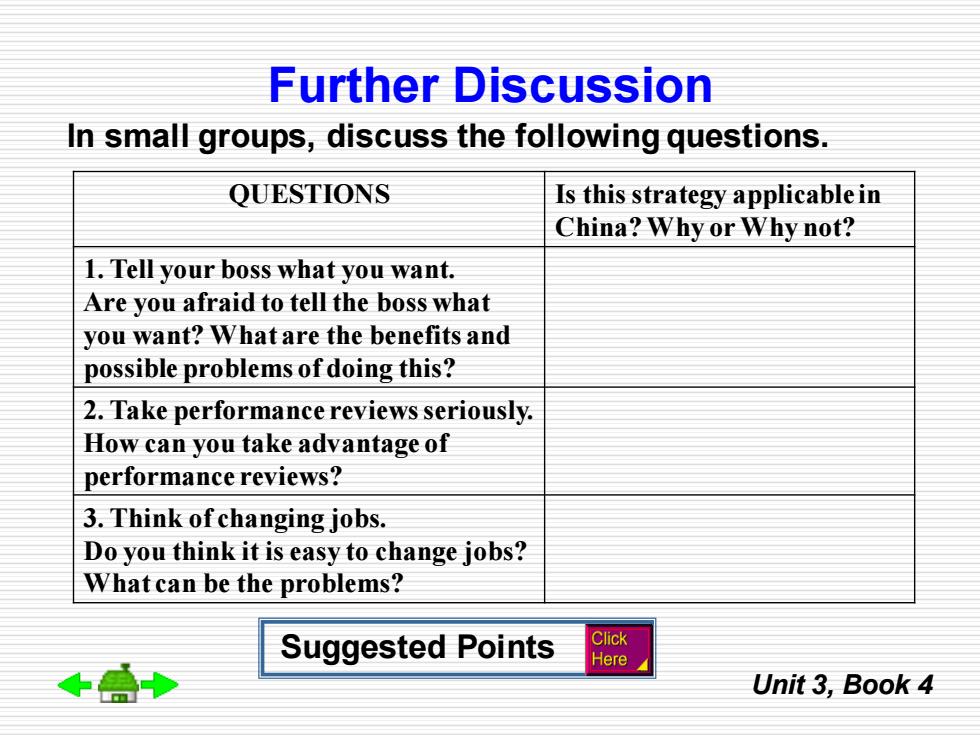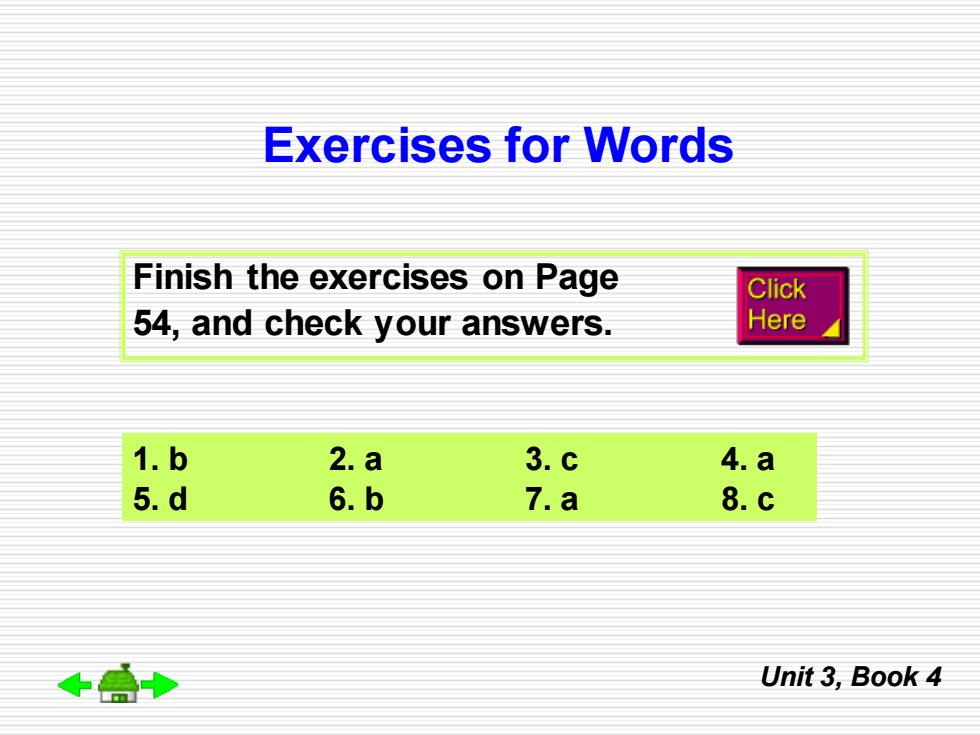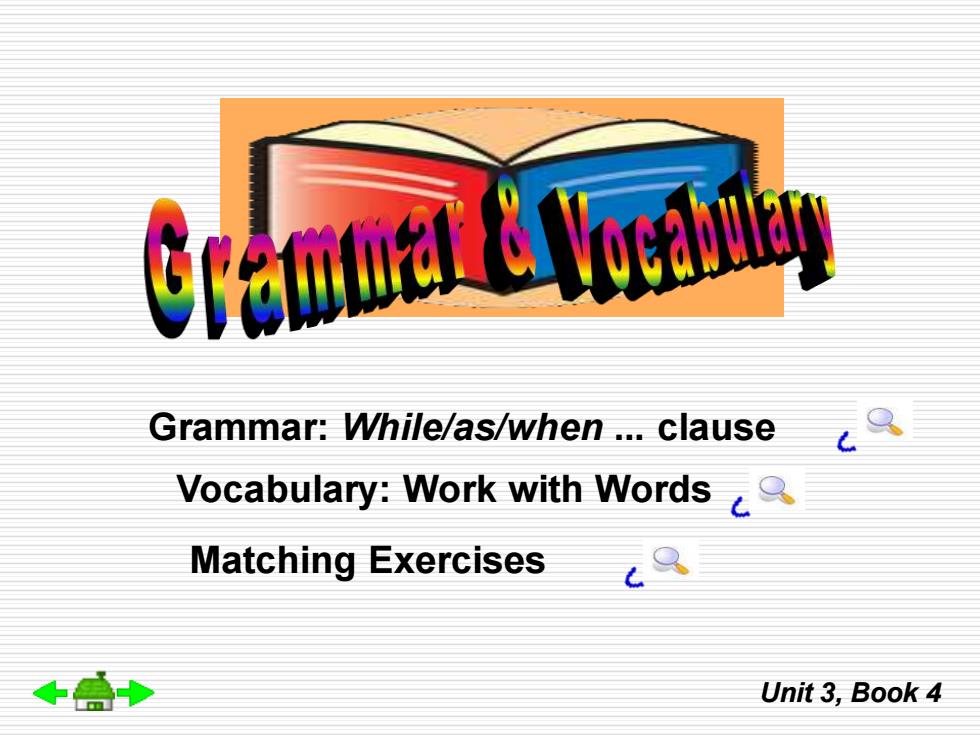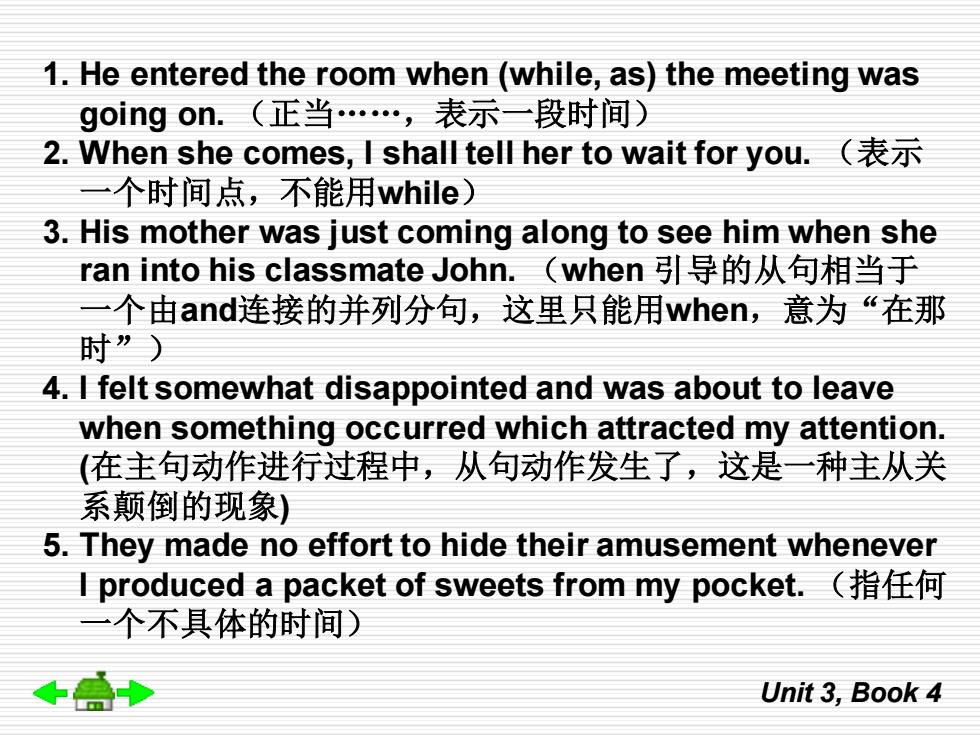
Further Discussion In small groups,discuss the following questions. QUESTIONS Is this strategy applicable in China?Why or Why not? 1.Tell your boss what you want. Are you afraid to tell the boss what you want?What are the benefits and possible problems of doing this? 2.Take performance reviews seriously. How can you take advantage of performance reviews? 3.Think of changing jobs. Do you think it is easy to change jobs? What can be the problems? Suggested Points Click Here Unit 3,Book 4
Further Discussion QUESTIONS Is this strategy applicable in China? Why or Why not? 1. Tell your boss what you want. Are you afraid to tell the boss what you want? What are the benefits and possible problems of doing this? 2. Take performance reviews seriously. How can you take advantage of performance reviews? 3. Think of changing jobs. Do you think it is easy to change jobs? What can be the problems? In small groups, discuss the following questions. Suggested Points Unit 3, Book 4

Exercises for Words Finish the exercises on Page Click 54,and check your answers. Here 1.b 2.a 3.c 4.a 5.d 6.b 7.a 8.c Unit 3,Book 4
Unit 3, Book 4 1. b 2. a 3. c 4. a 5. d 6. b 7. a 8. c Exercises for Words Finish the exercises on Page 54, and check your answers

H4 Grammar:While/as/when .clause Vocabulary:Work with Words Matching Exercises Unit 3,Book 4
Grammar: While/as/when . clause Vocabulary: Work with Words Matching Exercises Unit 3, Book 4

While/As/When .Clause when、as、while和whenever都可以引导时间 状语从句。when表示具体某个时间,引导的从句的 动作可与主句同时发生或先于主句发生,可指一段时 间也可指一个时间点。when有一个用法是在主句动 作进行过程中,从句动作发生了。而while只能表示 持续性的动作或状态,不能表示一时性或短暂的动作, as表示的从句的动作与主句动作同时发生,具有延续 含义。as和while可译为“一边.一边.” “正当.的时候”。whenever指任何一个不具体 的时间。 examples< Unit 3,Book 4
Unit 3, Book 4 when、as、while 和whenever都可以引导时间 状语从句。when 表示具体某个时间,引导的从句的 动作可与主句同时发生或先于主句发生,可指一段时 间也可指一个时间点。when 有一个用法是在主句动 作进行过程中,从句动作发生了。而while只能表示 持续性的动作或状态,不能表示一时性或短暂的动作, as表示的从句的动作与主句动作同时发生,具有延续 含义。as和while可译为“一边.一边.” 、 “正当.的时候” 。whenever指任何一个不具体 的时间。 examples While/As/When . Clause

1.He entered the room when (while,as)the meeting was going on.(正当.,表示一段时间) 2.When she comes,I shall tell her to wait for you. 个时间点,不能用while) 3.His mother was just coming along to see him when she ran into his classmate John.(when引导的从句相当于 一个由and连接的并列分句,这里只能用when,意为“在那 时”) 4.I felt somewhat disappointed and was about to leave when something occurred which attracted my attention. (在主句动作进行过程中,从句动作发生了,这是一种主从关 系颠倒的现象) 5.They made no effort to hide their amusement whenever I produced a packet of sweets from my pocket.(指任何 个不具体的时间) Unit 3,Book 4
Unit 3, Book 4 1. He entered the room when (while, as) the meeting was going on. (正当.,表示一段时间) 2. When she comes, I shall tell her to wait for you. (表示 一个时间点,不能用while) 3. His mother was just coming along to see him when she ran into his classmate John. (when 引导的从句相当于 一个由and连接的并列分句,这里只能用when,意为“在那 时”) 4. I felt somewhat disappointed and was about to leave when something occurred which attracted my attention. (在主句动作进行过程中,从句动作发生了,这是一种主从关 系颠倒的现象) 5. They made no effort to hide their amusement whenever I produced a packet of sweets from my pocket. (指任何 一个不具体的时间)